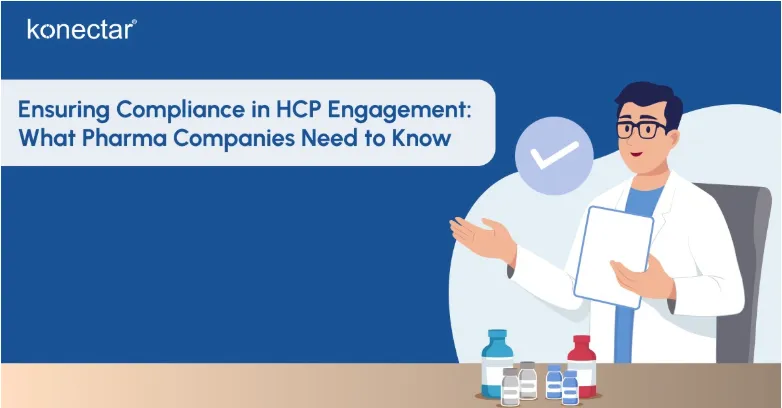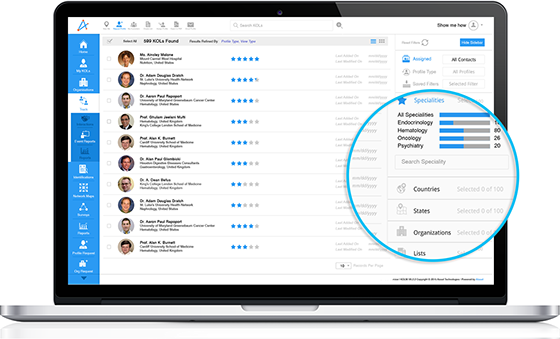14-04-2025
Ensuring Compliance in HCP Engagement: What Pharma Companies Need to Know

Compliance today isn’t just a box to check—it’s the backbone of every successful HCP engagement-pharma strategy. For pharmaceutical companies, biotech firms, and others in the healthcare space, navigating the fine line between impactful outreach and regulatory boundaries is critical.
From speaker programs to digital outreach, regulatory scrutiny is intensifying across regions. Guidelines globally require complete transparency around payments, meetings, and data exchange with HCPs. Any lapse, whether intentional or accidental—can damage reputations, lead to hefty fines, and erode trust within the medical community.
In this article:
- 1. Why Compliance in HCP Engagement Matters
- 2. Top Regulatory Pitfalls for Healthcare Companies
- 3. How the Pharmaceutical Industry Is Adapting
- 4. Creating a Compliance-First HCP Marketing Strategy
- 5. The Benefits of Compliance in HCP Engagement
- 6. Looking Ahead: Trends in Pharmaceutical Industry Engagement
- 7. Final Thoughts: Compliance as a Strategic Advantage
- 8. Conclusion
Why Compliance in HCP Engagement Matters
Interactions with HCPs influence critical decisions about treatments and patient care. As a result, pharmaceutical and healthcare companies must ensure these engagements meet strict legal and ethical standards. Certain countries mandate full transparency regarding financial relationships, including disclosing of the payments and other transfers of value. Whether attending a conference or participating in a speaker program, all engagements must be tracked and reported accurately.
Top Regulatory Pitfalls for Healthcare Companies
1. Transparency Gaps in Payments: Providing meals, honorariums, or travel reimbursements is common in the industry. However, if not reported transparently, even legitimate interactions may be viewed as unethical or non-compliant.
2. Off-Label Information Sharing: Sharing clinical updates is important, but HCP marketing must avoid discussing unapproved or off-label uses. Such content, even when shared casually, could be flagged as promotional and lead to violations.
3. Inadequate Handling of HCP Data: Healthcare and pharmaceutical companies must manage HCP data in compliance with GDPR (The General Data Protection Regulation), or other relevant data protection laws. Mismanagement of digital records can result in severe penalties.
4. Inconsistent Team Training: Non-compliance often stems from internal gaps. Sales, marketing, and medical teams must be trained regularly to stay aligned with the latest industry guidelines and internal policies.
How the Pharmaceutical Industry Is Adapting
The landscape of HCP engagement is shifting rapidly, especially with digital transformation accelerating post-pandemic. Here are some notable trends in the pharmaceutical industry:
1. Embracing HCP Digital Marketing: With remote work becoming more common, digital engagement has taken center stage. Webinars, e-detailing, and virtual events have replaced many in-person interactions, helping companies maintain relationships while ensuring compliance.
2. Data-Powered Engagement: Advanced HCP engagement platforms such as AI-powered konectar, are empowering pharmaceutical teams to identify the most relevant HCPs based on strategic objectives—such as publication history, clinical trial experience, advisory board participation, and other key criteria. These platforms help pharmaceutical agencies to record, manage, and track interactions, which in turn help them drive engagements with medical professionals efficiently.
3. Documentation Management Tools: Implementing these tools help capture and organize interaction records, making it easier to maintain accurate documentation. These systems simplify compliance reporting and ensure that teams are always prepared for audits, with easily accessible and well-structured data.
Creating a Compliance-First HCP Marketing Strategy
A strong compliance framework ensures not only safety but also strategic growth. Here’s how to embed compliance into your HCP marketing strategy:
1. Establish Clear SOPs: Develop standardized processes for all interactions. Maintain clear approval workflows and documentation practices for each HCP engagement.
2. Leverage the Right HCP Engagement Platform: Select platforms that offer compliance-friendly features and support integration with existing CRMs. These platforms are invaluable to both small biotech startups and large US pharma companies.
3. Continuous Staff Education: Regular training sessions for commercial, medical, and legal teams ensure everyone understands their roles and responsibilities. This culture of accountability can help reduce compliance risks.
4. Cross-Functional Collaboration: Involve your legal, compliance, and medical affairs teams from the planning stage of any HCP marketing initiative. This fosters synergy and minimizes last-minute changes that can compromise compliance.
5. Monitor, Review, and Refine: Conduct periodic audits and feedback sessions to identify potential compliance gaps. Refining your strategy over time ensures sustained success.
The Benefits of Compliance in HCP Engagement
Pharmaceutical companies that prioritize compliance often enjoy more productive and long-lasting relationships with HCPs. These connections are rooted in transparency, respect, and shared commitment to patient care.
While regulatory expectations are on rise, so is the opportunity to differentiate through ethical conduct. Demonstrating compliance builds credibility and positions your company as a trusted industry leader.
Key Features to Look for in HCP Engagement Solutions
Choosing the right tools is crucial for scalable and compliant engagement. Here’s what to prioritize:
1. Integrated Logs: Ensure all interactions are documented and traceable. While not automated, teams are required to consistently log every engagement for transparency, audits, and future reference.
2. Multichannel Outreach: Facilitate HCP engagement across various touchpoints—webinars, email campaigns, virtual meetings, and more—ensuring consistent and accessible communication.
3. Centralized Access for Cross-Functional Teams: Enable legal, regulatory affairs, medical, and commercial teams to access engagement data from a unified dashboard, ensuring alignment, reducing miscommunication, and improving compliance oversight.
4. CRM Syncing: Instead of using multiple tools, a unified system ensures seamless integration, prevents errors, and improves operational efficiency. Auto-updates across platforms maintain consistency and eliminate redundant entry.
5. Custom Analytics: The platform should be capable of delivering tailored analytics across the HCP landscape, including sentiment analysis, clinical trial site distribution, fellowship tracking, and medical conference insights.
Whether you are a part of a pharmaceutical company, a health device brand, or a biotech innovator, robust engagement tools provide a strong foundation for compliant outreach.
Looking Ahead: Trends in Pharmaceutical Industry Engagement
As the pharmaceutical industry continues to evolve, compliance will remain a central focus. The future points toward:
- Increased use of analytics to refine HCP engagement strategy
- Adoption of AI-powered HCP management platforms
- Greater transparency across all efforts when engaging HCPs
- Enhanced collaboration among legal, marketing, and medical affairs
Final Thoughts: Compliance as a Strategic Advantage
Compliance should be viewed not as a limitation, but as a powerful enabler of ethical and impactful engagement. For pharmaceutical companies, healthcare organizations, and medical companies, building trust with HCPs begins with following the rules—and often ends with lasting partnerships.
By investing in the right tools, training, and strategies, HCP engagement becomes not just compliant, but highly effective.
FAQs
- How can pharma companies ensure compliant digital engagement with HCPs?
Companies should use digital platforms with built-in compliance features like consent tracking, engagement logging, audit trails, and CRM integration to ensure transparency and regulatory alignment.
- What are common compliance risks in HCP marketing?
Risks include off-label promotion, lack of documentation, improper data handling, and unreported transfers of value such as meals, gifts, or honorariums.
- Why is cross-functional collaboration important for compliance?
Involving legal, medical, and commercial teams from the start ensures every HCP campaign/engagement aligns with company policies and regional regulations, reducing the risk of non-compliance.





